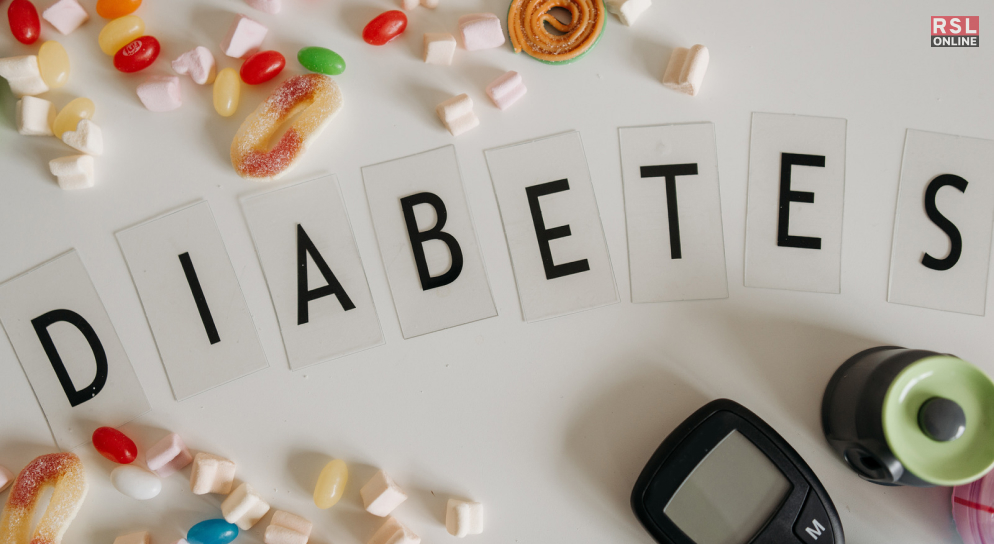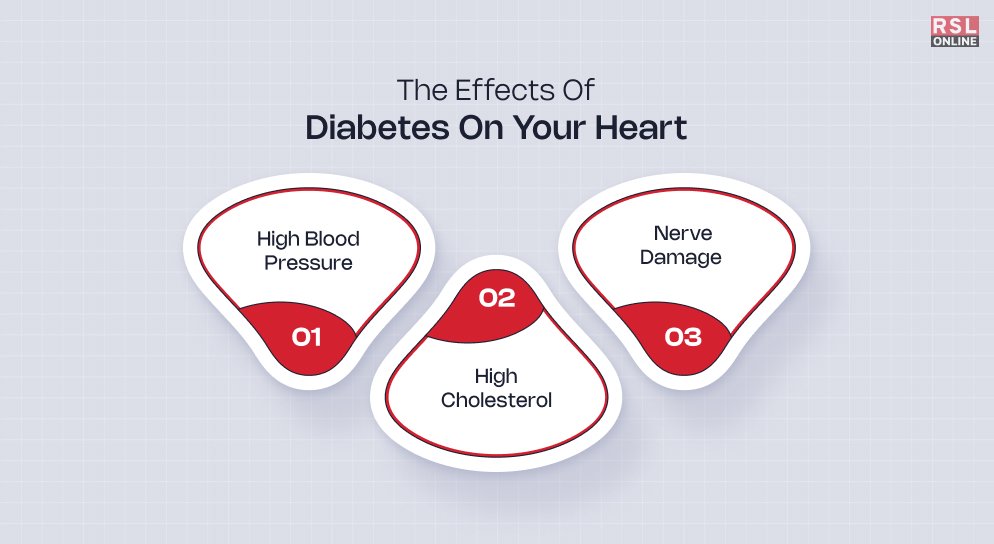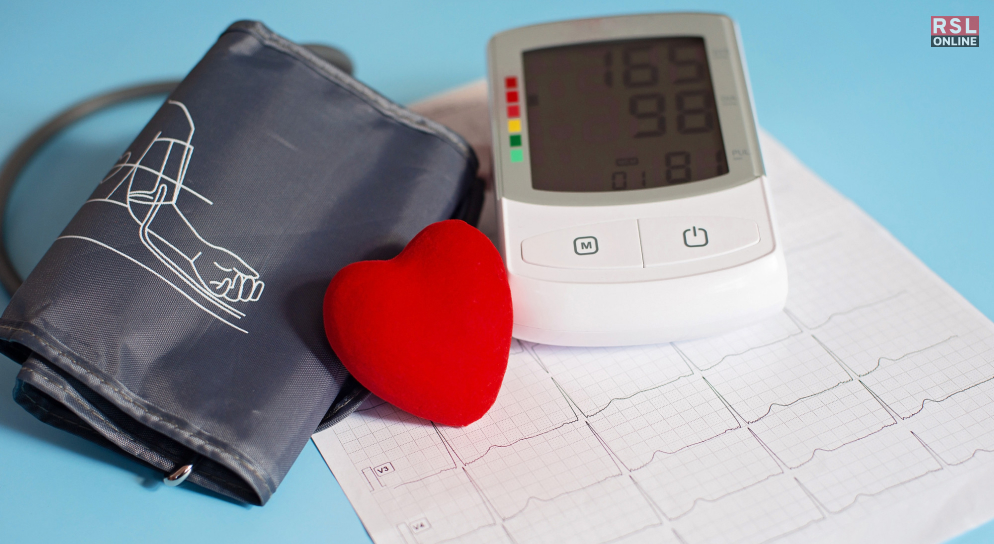Diabetes increases your risk of getting heart disease. This can lead to stroke and heart attacks. Heart disease is the global cause of death; 4 out of 5 deaths are caused by heart attacks and strokes.
1/3 of these deaths occur prematurely in individuals under 70 years.
Did you know that people in the UAE die of heart attacks 20 years earlier than in other countries?
The threshold for heart attacks and cardiovascular diseases globally is 65 years, while in the UAE, people suffer from cardiovascular diseases as early as 45 years.
In this article we try to find out how diabetes and heart disease are interconnected.
Definition Of Diabetes?

Diabetes mellitus (diabetes) is a metabolic disease that leads to high blood sugar.
It is a chronic disease that occurs when the pancreas does not produce adequate insulin or when your body cannot sufficiently use the insulin it produces.
Untreated high blood sugar caused by diabetes can damage your eyes, kidneys, nerves, and other organs.
Different types of diabetes include diabetes type 1, an autoimmune disease that causes your immune system to attack and destroy the cells in your pancreas.
Type 2 diabetes, on the other hand, occurs when your body becomes insulin-resistant.
Prediabetes occurs when a patient’s blood sugar level is higher than normal but not high enough that one diagnosis it as type 2 diabetes. Gestational diabetes happens during pregnancy; it’s caused by insulin-blocking hormones produced by the placenta.
What Are The Effects Of Diabetes On Your Heart?

Diabetes and cardiovascular diseases often go hand-in-hand; high blood sugar can wreak havoc on your nerves and blood vessels in your heart. Yes, diabetes and heart disease are connected in various ways.
High Blood Pressure
Hypertension/high blood pressure has a link to type 2 diabetes. Hypertension causes excessive strain on the coronary arteries of the heart; they become narrowed because of excess cholesterol, fat buildup, and other substances.
These are called plaque, and the slow buildup process is called atherosclerosis.
Plaque causes arteries to harden; this increases the likelihood of clots forming.
It is necessary to consult your cardiologist in Dubai if you have diabetes.
The blockage of an artery by clots or plaque interrupts blood flow throughout the heart; this starves the heart of nutrients and oxygen. It damages the heart and causes a cardiovascular attack.
High Cholesterol
Cholesterol is a fat-like substance that travels throughout your bloodstream. Too much cholesterol is unhealthy.
Blocked or narrowed arteries prevent blood flow to the heart and brain; this can cause heart attacks, stroke, or heart failure. It’s crucial to go for a checkup in a medical center in Dubai to learn if you have high cholesterol.
Although the liver produces enough cholesterol for your body, you can also get it from your food.
Excess cholesterol deposits on the artery walls, forming plaque that hardens with time and narrows the arteries.
Narrow arteries make it difficult for blood to flow; this strains the heart as it works harder to pump blood throughout your body. Ultimately, your heart gets weak and ineffective.
Blood clots can also form over the hardened parts of the arteries, completely blocking them; this cuts off blood flow.
Parts of the clots can break away resulting in a block in the vein or artery, causing a stroke or heart attack.
Nerve Damage
Diabetes causes a nerve damage disease known as diabetic neuropathy; it affects various types of nerves, like motor and sensory nerves.
Did you know that nerves relay messages between the brain and other body parts like seeing and hearing?
They also relay signals like heart rates. Nerve damage can cause serious problems for individuals with diabetes.
One of the long-term complications of diabetes is nerve damage; over time, it damages the small blood vessels connected to the nerves in your body.
This way, essential nutrients do not reach the nerves; this might cause damage to the nerve tissues, or they might disappear.
This damages various nerves, like motor, sensory, and autonomic nerves.
Sensory neuropathy occurs when nerves that transmit messages of pain, temperature, touch, and other sensations from bones, muscles, and skin to the brain are damaged.
It can wreak havoc on the nerves in the feet and legs, but some people also get this neuropathy in their hands and arms.
Autonomic neuropathy affects nerves that relay messages to glands and organs.
They control some functions without your conscious direction, like heart beating and bowel control. You can get irregular heartbeats, loss of bladder control, and other functions.
Motor neuropathy damages nerves that control movement; muscles that receive messages from these nerves become waste away and become weak.
This can cause problems with muscle cramps and twitching and loss of muscle wasting.
How Diabetes And Heart Disease Are Interlinked?

We discussed the effects of diabetes on your heart. Hence, it requires no rocket science to say that there is a relationship between diabetes and heart disease.
Yes, in this small section, we discuss what increases your chances of heart disease or stroke if you are already gripped by diabetes. So, let’s discuss it here to gain a better understanding.
Smoking
If you are an avid smoker, then you have a greater risk of heart disease. It is important to stop smoking because smoking because smoking and diabetes narrow the blood vessels.
Also, smoking increases your opportunities to develop long-term problems like lower leg infections and ulcers, lung disease, and leg amputation.
Abnormal Cholesterol levels
Cholesterol is a type of fat; your liver produces that, and it is also found in your blood. There are two kinds of cholesterol: HDL and LDL.
LDL is often called bad cholesterols, and it can build up and clog your blood vessels. Also, higher levels of HDL and LDL have a direct relationship with decreasing heart disease. Hence, you need to eat more plant-based foods and engage in regular physical activity.
Obesity And Belly Fat
You will find it difficult to manage your diabetes if you are overweight or if you are having obesity. Yes, this point is perhaps most common when you discuss diabetes and heart disease.
Excess belly fat around your waist, even if you are not overweight, can increase your opportunity of heart disease. Take it as a third rule: if you are more than 40 inches and you are a man, then you must be cautious.
The same goes for females with more than 35 inches.
Other than this, even a family history of heart disease and chronic kidney disease has a close link to your heart disease heart disease.
Heart disease is one of the leading causes of global deaths, and this happened 20 years earlier in the UAE. Diabetes and heart disease have connections.
Diabetes causes high blood pressure, nerve damage, and high cholesterol, which are dangerous to the heart. It’s necessary to go for regular checkups and to maintain a healthy lifestyle to avoid getting a heart attack or stroke.
Putting The Discussion To A Close
Heart disease is one of the leading causes of global deaths, and this happened 20 years earlier in the UAE. Diabetes and heart disease are connected.
Diabetes causes high blood pressure, nerve damage, and high cholesterol, which are dangerous to the heart. Hence, it is necessary to go for regular checkups and to maintain a healthy lifestyle to avoid getting a heart attack or stroke.
Additional Reading:




























